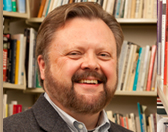Philosophy and the Liberal Arts
Dr. David Fletcher
 If the liberal arts are “concerned with important educational aims: cultivating intellectual and ethical judgment, helping students comprehend and negotiate their relationship to the larger world, and preparing graduates for lives of civic responsibility and leadership” (Schneider), philosophy is perhaps the liberal arts discipline par excellence. These objectives are central to all of our work. Philosophy is a core liberal arts discipline and has always been a central part of liberal arts education. That also means that when those who demand marketplace relevance of a higher education degree call the liberal arts into question, philosophy is pointed to as a discipline that is paradigmatically impractical.
If the liberal arts are “concerned with important educational aims: cultivating intellectual and ethical judgment, helping students comprehend and negotiate their relationship to the larger world, and preparing graduates for lives of civic responsibility and leadership” (Schneider), philosophy is perhaps the liberal arts discipline par excellence. These objectives are central to all of our work. Philosophy is a core liberal arts discipline and has always been a central part of liberal arts education. That also means that when those who demand marketplace relevance of a higher education degree call the liberal arts into question, philosophy is pointed to as a discipline that is paradigmatically impractical.
A Useless Degree?
Philosophers are well aware that their discipline is seen as useless for practical purposes, a degree that leads to careers at Starbucks. Philosophers’ responses to this charge will vary. Some will agree with Eva Brann “Those who have liberal education in their keeping… should not give an inch to demands for utility or currency.” (Brann) They will value philosophy for its own sake and insist that their students do the same. They might insist with Heidegger that the student must “Ask not what you can do with philosophy, but what philosophy can do with you.”
This response rings true to philosophers, but is unlikely to convince anyone of philosophy’s worth who is not already a believer. Is it so unacceptable to expect a liberal arts discipline such as philosophy to show itself of value in the world of practical affairs? Or is any attempt to identify useful functions with philosophy a capitulation to a starkly utilitarian worldview that can only assign value in one-dimensional ways?
A Practical Degree
Philosophy departments, including the one at Wheaton College, have for decades found ourselves touting the practical benefits of studying our discipline. This practice in our department goes back to the leadership of our longtime chair and liberal arts apostle, Arthur F. Holmes. We have spoken to students about the exciting, non-barista careers their predecessors have enjoyed, pointed out that our majors perform well on standardized tests such as the LSAT and the MCATs, and extolled the instruction they will receive in critical thinking, writing, and speaking, as well as developing a Christian worldview. Arthur believed that studying philosophy really had these benefits and wanted students (and their parents) to understand that it did, but of course what he found most valuable about the discipline was the voyage of faith-directed self-discovery that our students embark upon, not the practical takeaways.
Cross Departmental Partnerships Provide Even More Value
Another way in which philosophy is practical is the movement in most departments, including ours, to embrace our cross disciplinary role as a service department. We encourage students in other majors to think philosophically about important issues in their fields. My own regular assignment includes teaching Philosophy of Law, Global Justice, Business Ethics, and Biomedical Ethics to mostly nonmajors. The latter two courses are even team-taught with a member of another department. Those courses testify to the practical relevance of a discipline devoted to foundational, normative, and non-empirical issues as it engages with a practical field such as law, international affairs, business, and medicine. Other philosophy courses such as Philosophy of the Arts serve a similar purpose. Whether the students in these courses add a major in philosophy or even take further courses in the department, they are having a liberal arts experience even at the time that they have begun to focus their efforts more and more intensively on their projected career path and its needs.
The Most Practical and Relevant of All
They are learning that philosophy, a liberal arts discipline, can contribute to their understanding of their practical career path. After all, one doesn’t simply plug into a career and expect life to be simple and predictable. For example, moral concerns arise in all fields, concerns about one’s personal conduct and about the justice and purpose of systems in which one participates, whether health care or the law. Many former students have reported back after several years in a career that things they learned in the classes we worked on together have been crucially important to them as they have attempted to resolve dilemmas that their careers have provided them with. One physician who while at Wheaton had studied Biomedical Ethics with me in the 1980s has admitted that when he was here he was quite goal directed, focused on getting into medical school more than on understanding the sort of questions that philosophy or indeed the liberal arts as a whole held forth as desirable. Today that physician is deeply involved not only in medical ethics, but in understanding philosophical trends in modern society, which he shares during a guest lecture every fall to the Biomedical Ethics class. In his mind, as in many others, liberal arts concerns turn out to be the most practical and relevant of all.
Eva Brann, “Eight Theses on Liberal Education” (http://faculty.pepperdine.edu/mgose/GBQuarterly/winter00/brann.html ), distributed in CACE Faculty Seminar, May, 2013.
Carol Geary Schneider, “Practicing Liberal Education: Formative Themes in the Re-invention of Liberal Learning”, distributed in CACE Faculty Seminar, May, 2013.